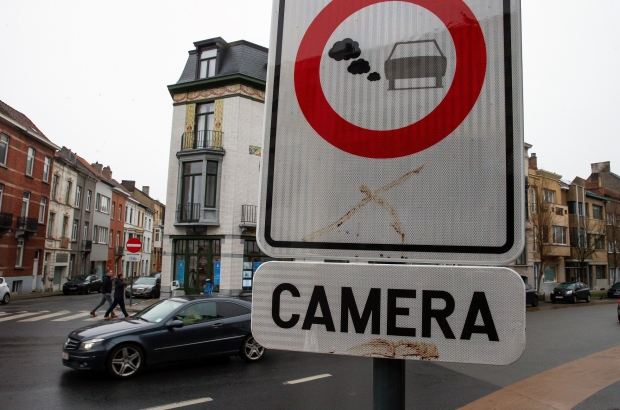- Daily & Weekly newsletters
- Buy & download The Bulletin
- Comment on our articles
Three parties call to postpone Brussels low-emissions zone extension
Post-election negotiations aimed at forming Brussels’ next government have stalled after three parties put forth a proposal to postpone stricter low-emission zone (LEZ) standards by two years.
Euro 5 diesel vehicles are due to be banned from the Belgium capital once the standards enter into force in January 2025, affecting an estimated 600,000 cars nationwide and 33,000 registered in Brussels.
But proponents of delaying the legislation - including representatives from the MR, Les Engagés and PS parties - say owners of such vehicles have not had enough time or money to switch to less-polluting ones.
Regional party leaders David Leisterh (MR), Ahmed Laaouej (PS) and Christophe De Beuckelaere (Les Engagés) say delaying the new standards until January 2027 is one of two urgent priorities, the other being the Renolution grants that help Brussels residents subsidise energy-saving home improvements.
The budget for those grants ran out before the end of summer, leaving many residents with renovation plans hanging. The same happened last year, but the budget was then replenished.
“People who started renovation works with the legitimate expectation of receiving a premium for it should be entitled to it – that is a matter of trust,” the parties said in a joint statement.
As for the LEZ standards, the parties argue that a delay is a “pragmatic approach” that “would allow people “to adapt to the next phase at a realistic pace”.
But the proposed delay has irked other parties involved in the negotiations to form a new Brussels government, with Elke Van den Brandt (Groen) calling it a “bomb planted underneath the negotiations”.
Van den Brandt said the fact that the French-speaking MR, PS and Engagés parties are “negotiating agreements behind the scenes is a clear signal that they want to work without the Dutch-speaking parties”, which Groen has called both a breach of trust and a showing of a lack of respect for the Dutch-speaking parties.
“The low-emission zone is a very sensitive issue that needs to be discussed at the negotiating table,” said Groen co-president Nadia Naji.
“Groen has always taken a very constructive stance and has proposed to start discussions on mobility policy. Wanting to push through positions unilaterally, without consultation, undermines the trust needed to negotiate a coalition agreement.
"This modus operandi is nothing more than a lack of respect for the formation's Dutch-speaking partner. David Leisterh, Ahmed Laaouej and Christophe De Beukelaer are opting for backroom politics and putting trust at stake. It's irresponsible. We regret this attitude."
Van den Brandt pointed out that a majority on the Dutch-speaking side is required for governing in Brussels.
“Groen won the Brussels elections convincingly with a programme for a city on people's terms,” said Van den Brandt.
“Since [the elections on] 9 June, we have tried to find constructive solutions in a complex political context. It is up to Mr Leisterh to show whether this is how he wants to govern Brussels. The people of Brussels deserve a government that works together.”
But while the creation and timing of the proposals have been sharply criticised, many in construction and at the federation of automotive professionals have voiced support for delaying the LEZ standards and continuing to help homeowners with 2024 renovations.
“Our view is that we are now starting to affect a category of car that is the one most used by Belgians,” said the latter’s secretary general, Serge Istas.
“The average Belgian has a car that is 10 years old. So we're really getting to the heart of the market, and it seems to us that we're a little ahead of our time in terms of finding alternative solutions.µ
"Yes, we're going to be dealing with vehicles that are going to cause a little extra pollution compared with the latest models available on the market. But the gain isn't huge either. We're affecting a lot of people for very little gain.”
Others say that the parties behind the proposals are putting public health on the back-burner. The Belgian capital is one of Europe’s worst for air pollution, which is estimated to cause around 9,000 premature deaths each year.
“This political manoeuvre will ruin the efforts of the people of Brussels to protect the health of their children and their elders, as well as the most disadvantaged sections of the population, and runs counter to the European climate objectives, which aim to achieve carbon neutrality by 2050,” the Ecolo party said.
They accuse the parties of deceiving voters, breaking “the promise they made to voters during the campaign to make public health a priority; and the commitments made by their own Brussels environment minister, Céline Fremault, who was behind the introduction of the low-emission zone in Brussels in 2018.”
“Forming a government or launching their municipal campaign: the PS and the MR have chosen, and so have Les Engagés, to the detriment of the health of the people of Brussels, who deserve to breathe quality air, especially children,” said Ecolo’s co-president Marie Lecocq.
“I'm thinking of Anissa, the mother I spoke to in Forest, who was telling me about her asthmatic son. She was telling me that she wasn't sure she could continue to live in Brussels because of the poor air quality. We're shocked that these three parties have decided to ignore the health of the people of Brussels.”



















